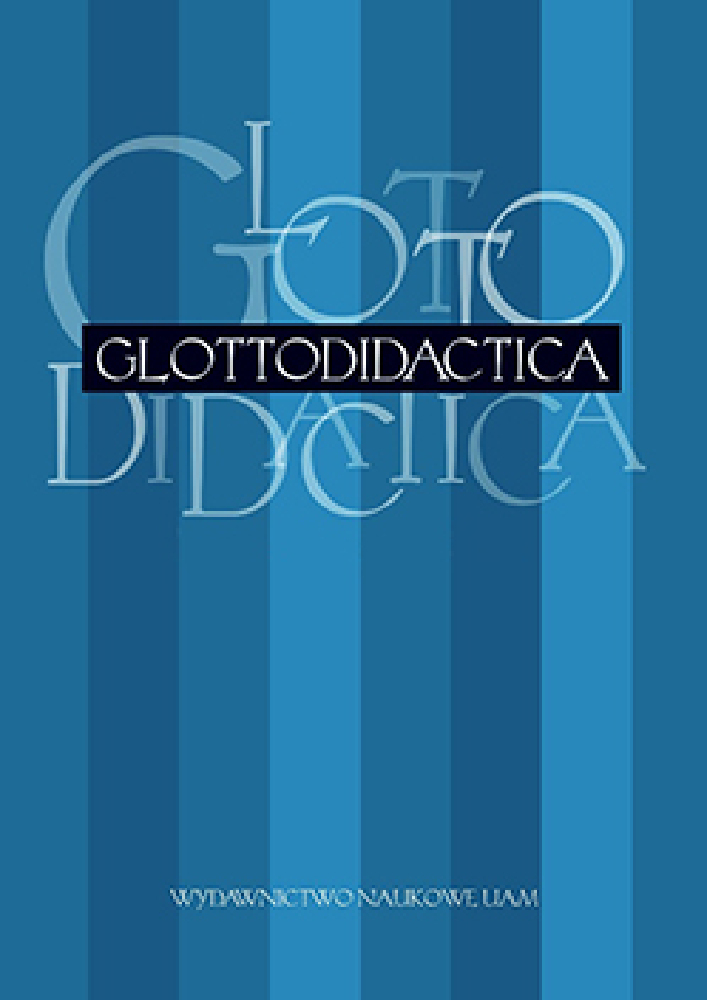Abstract
The article discusses some basic notions related to intercultural foreign language teaching. These include: intercultural communication competence, intercultural teaching, and intercultural training. The article also presents the results of research allowing an overview of the status quo of interculturality from the perspective of Polish teachers of the German language. The research is of a very general nature as it was supposed to counterbalance numerous operationally detailed surveys and provide data on to what extent the teachers understand interculturality as a general guideline in teaching German as a foreign language.
References
Aleksandrowicz-Pędich, L. 2005. Międzykulurowość na lekcjach języków obcych. Bialystok: Wydawnictwo Uniwersytetu w Białymstoku.
Bennett, M. 1993. Towards ethnorelativism: A developmental model of intercultural sensivity. In: R.M. Paige (Hrsg.). Education for the intercultural experience. Yarmouth: Intercultural Press, 27-71.
Doye, P. 1994. Interkulturelles Lernen im Fremdsprachenunterricht. In: Bausch, K.R./Christ, H./ Krumm, H.-J. (Hrsg.). Interkulturelles Lernen im Fremdsprachenunterricht, Arbeitspapiere der 14. Frühjahrskonferenz zur Erforschung des Fremdsprachenunterrichts. Tübingen: Narr, 43-45.
Edmonson, W. 1994. Was trägt das Adjektiv „interkulturell“ zu unserem Verständnis vom Lernen im Fremdsprachenunterricht bei? In: Bausch, K.-R. (Hrsg.). Interkulturelles Lernen im Fremdsprachenunterricht. Tübingen: Gunter Narr, 85-89.
Van Ek, J.A. 1986. Objectives for Foreign Language Learning. Strasbourg: Council of Europe.
Fennes, H./ Hapgood, K. 1997. Intercultural learning in the classroom. Crossing borders. London: Cassel.
Flechsig, K.-H. 1998. Methoden interkulturellen Trainings. In: Flechisg, K.-H. (Hrsg.). Materialien zum interkulturellen Training. Göttingen: Institut für Interkulturelle Didaktik, 1-20.
Flechsig, K.-H. 2006. Beiträge zum Interkulturellen Training. Göttingen: Institut für Interkulturelle Didaktik.
Gardner, G.H. 1962. Cross-cultural communication. In: Journal of Social Psychology, 8, 241-256.
Gogolin, I. 1994. Der monolinguale Habitus der multilingualen Schule. Münster / New York: 2008.
Gudykunst, W.B./Hammer, M.R. 1983: Basic Training Design: Approaches of Intercultural Training. In: Landis, D./Brislin, R.W. (Hrsg.). Handbook of Intercultural Training. New York: Pergamon, 118-154.
Hall, E. 1984. Poza kulturą. Warszawa: PWN.
Hanvay, R. 1979. Cross – Culture Awareness. In: Smith, E.C./Luce, L.F. (Hrsg.). Toward Internationalism: Reading in Cross Culture Communication. Rowley, MA: Newbury House, s. 46-56.
Hoopes, D.S. 1979. Intercultural Communication Concepts and the Psychology of Intercultural Experience. In: Pusch, M.D. (Hrsg.). Multicultural Education. A Cross Cultural Training Approach. Yarmouth, ME: Intercultural Press, 9-39.
Kim, Y.Y. 1988. Communication and Cross-Cultural Adaptation. New York: Multilingual Matters.
Klopf, D. 2001. Intercultural encounters. Colorado: Morton Publishing.
Komorowska, K. 1999. Metodyka nauczania języków obcych. Warszawa: WSiP.
Königs, Frank G. 1994. Schillernd, aber spannend: Überlegungen zum Begriff des Interkulturellen Lernens. In: Bausch, K.-R./ Christ, H./ Krumm, H.-J. (Hrsg.). Interkulturelles Lernen im Fremdsprachenunterricht, Arbeitspapiere der 14. Frühjahrskonferenz zur Erforschung des Fremdsprachenunterrichts. Tübingen: Narr, 101-108.
Lewicki, R. 2002. Poznaj język sąsiada. Program nauczania – język niemiecki. Warszawa: Wydawnictwo Szkolne PWN.
Liddicoat, A.Z. 2003. Teaching Languages for Intercultural Communication. In: Berkley Language Centre Newsletter, 19, 1-17.
Moran, P. 2001. Teaching culture: Perspectives in Practice. London: Heinle&Heinle.
Paige, R.M. 1993. Education for the intercultural experience. Yarmouth ME: Intercultural Press.
Pusch, M. 1994. The chameleon capacity. In: Lambert, R.D. (Hrsg.). Educational exchange and global competence. New York: Council of International Educational Exchange, 205-210.
Skowronek, B. 2014. Glottodidaktik und Fremdsprachenunterricht in der Diskussion. Poznań: Wydawnictwo Naukowe.
Wiseman, R.L. 2002. Intercultural communication competence. In: Gudykunst, W.B. / Mody, B. (Hrsg.). Handbook of International and Intercultural Communication. Thousand Oaks: Newbury Park, 207-224.
Zawadzka, E. 2004. Nauczyciele języków obcych w dobie przemian. Kraków: Oficyna Wydawnicza „Impuls“.
License
Copyright (c) 2015 Magdalena Białek

This work is licensed under a Creative Commons Attribution-NoDerivatives 4.0 International License.
Authors
Authors of texts accepted for publication in Glottodidactica are required to complete, sign and return to the Editorial team’s office the Agreement for granting a royalty-free license to works with a commitment to grant a CC sub-license.
Under the agreement, the authors of the texts published in Glottodidactica grant Adam Mickiewicz University in Poznań a non-exclusive, royalty-free license and authorize the use of Attribution-NoDerivatives 4.0 International (CC BY-ND 4.0) Creative Commons sub-license.
The authors retain the right to the free disposal of the work.
Users
Interested Internet users are entitled to use works that have been published in Glottodidactica since 2016, under the following conditions:
▪ attribution – obligation to provide, together with the distributed work, information about the authorship, title, source (link to the original work, DOI) and the license itself.
▪ no derivatives – the work must be preserved in its original form. Without the author's consent, it is not possible to distribute the modified work in the form of translations, publications, etc.
Copyrights are reserved for all texts published before 2016.
Miscellaneous
Adam Mickiewicz University in Poznań retains the property right as a whole (layout, graphic form, title, cover design, logo etc.).
Privacy statement
The names and email addresses published on this journal site will be used exclusively for the purposes declared by this journal and cannot be used for any other purpose or by any other party.




